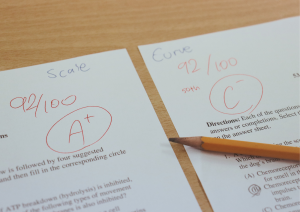Applications for executive positions begin for the 2022-’23 school year
Apr 14, 2022
As the second semester comes to a close, clubs have begun sifting through piles of applications to select new executive members for the 2022-’23 school year. The application process differs slightly from club to club but usually involves a comprehensive procedure that includes both interviews and written application forms. Rising sophomores, juniors, and seniors are welcome to apply for most executive positions, with each club having a varying number of available spots.
“When selecting executives for the next year, we look at a variety of factors, including a person’s level of involvement in the club,” Jeff McEvoy-Hein, MUN advisor, said. “Just like any leadership team, you need someone who works well with others; you need someone who can impart knowledge about the club; you need someone who is a go-getter. We look for the best team we can put together.”
Advisors and current executives look at an applicant’s level of experience as well as their responses during interviews when selecting prospective executives. Written applications give candidates an opportunity to showcase what they have done throughout the school year and their ability to effectively lead a club. Typically, these applications ask candidates to explain the qualities they possess that make them the best fit for a leadership position.
“If anything, what the student has done over the course of the year is most important,” Mr. McEvoy-Hein said. “You can fill out an amazing application and do a great interview but if you are not contributing to the club, that is a problem. Hopefully, people interested in an executive position submit an application that matches what they have done over the course of the year.”
Like any previous year, clubs are looking to balance the number of juniors and seniors on the executive team. While seniors may have more experience in a club, executives and advisers do not consider seniority as the sole factor in an applicant’s level of capability to hold a leadership position.
“Seniority is a factor, but neither as much nor in the way many might think,” Sean Kim (12), History Honor Society President, said. “Of course, the paramount factors in club executive selections are the applicants’ abilities and compatibility with the position. However, within those criteria also lie commitment and prowess. That is not to say younger members do not have a level of commitment and prowess comparable to those of more older members, but generally, older members have been in the club for longer, which exhibits prowess, as they may have held leadership positions elsewhere or have more experience with organizational skills.”
While seniority may have been a large part of the executive application process in the past, many clubs this year are looking to select newer members who are capable of demonstrating strong leadership. Young executives are in fact vital to many clubs at SIS.
“At this point in the process, my only input would be to ensure that younger members are selected, so that the Creative Software Development Club (CSDC) has a future,” Alexander Weir, CSDC advisor, said. “After the seniors graduate, I want to make sure that there are some people to take over. It is a new club this year, so for the sake of this club’s continuity, the current executives would need to pick some younger members in the club.”
Throughout the selection process, advisors and current executives play a collaborative role in handing down leadership positions for the next school year.
“A lot of advisors will rely on the leadership of the current executives in order to make a sound decision,” Jonathan Ames, club activities director, said. “But since the advisors are the ones working with the execs, they have the right to override a current executive’s decision during the selection process. If clubs are choosing their execs without the advisor’s approval, then that would be deemed an ineligible process. There needs to be a shared responsibility between the advisors and the current executives.”
There are no significant changes to this year’s application process compared to previous years. Interviews are a requirement, and clubs must decide on their executive selections by May 7.
“In the end, a lot about the application process will come down to how a club has written its by-laws,” Mr. Ames said. “Certain clubs will have rules or procedures in place for specific years or certain transitions in leadership semester by semester.”







